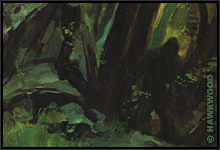We might think that we know the myth. Pandora, the first created woman, arrives from Olympus in the world of mortals together with a box. The box contains all the evils and pestilences which otherwise would plague humankind, but as long as they remain safely shut away then the world is a peaceable place. In her innocence, Pandora peeks inside the box to see what it might contain. Bad idea. The terrible contents are released into the world, and humankind has been afflicted with them ever since. Pandora just has the time – and the presence of mind – to shut the lid before the last thing escapes. That thing is Hope: only Hope is preserved safely, to be nurtured for the times when it is needed.
 |
| Pandora opens the box, as imagined by John William Waterhouse in the 19th-century. |
The story has a familiar echo. We need only think of that other first woman to be awake to the parallels of both stories. Eve in the Book of Genesis also had her problems with human curiosity, of crossing the line of deific instructions to release blight and death upon all of humankind. In a [1]previous post I have mentioned that this literal reading of Genesis points us towards only a superficial truth. And yet it is this ‘storybook’ truth which has dominated Western thinking – and our attitudes towards womankind – ever since. Eve the Woman is the cause of all our misery, and the active agent in releasing evil into what up till then had been blissful paradise.
Such shapers of early church doctrine as [2]Augustine and [3]Tertullian were in their writings only too eager to hammer this particular nail home. Woman is evil. Woman is a temptress. Woman is only good for bearing children. That canonical texts appeared to support such rampant chauvinist views gave enough legitimacy to such conclusions, even to the extent that right here in the twenty-first century the ideas of guilt, shame and sin still leave their traces on the minds, not only of the ‘faithful’, but also on the minds of those who seldom if ever set foot in a church.
That the story of the Fall in Eden can be interpreted in profoundly different [4]ways, and in ways which do not weigh down all womankind with the crushing burden of guilt, has gone largely unnoticed for centuries – mainly because the texts of these other versions were destroyed by the Augustines and the Tertullians of their world. What remains of these other texts has been down to the [5]chances of history, of surviving against all the odds. But we do have them, and they are in our world. But if it is possible to redeem Eve, to come at the story from a radically different angle, might the same be possible for the story of Pandora’s box? Does the apparently over-curious Pandora, that other first woman of Ancient Greek myth, actually display a profound wisdom?
All we humans who have come after Pandora might have continued to live in a state of carefree bliss. But is this truly what is intended for us? How can we progress if for us sorrow remains an unknown? How can we taste sweetness if bitter regret also is not part of the human condition? So carefully, carefully, Pandora opens the box, and the world becomes as we experience it, with all its joys and its sorrows, its pains and its heartaches. It is not that we experience pain and loss. It is what we do with these emotions which potentially opens the door to growth of the spirit. But what of Hope?
 |
| A repentant Eve portrayed by Anna Lee Merritt in the 19th-century. But is such deep and bitter contrition by Eve - and also by Pandora - misplaced? |
Hope is left behind, sealed shut. Wise Pandora knows the folly of hope. Hope can be a false god, for so often hope can foster false expectations. Only by relinquishing hope are we truly free to act from a position of strength. With hope we might be fighting with one hand tied behind our backs. Without hope our actions are unlimited by any thoughts of ‘wishing for’, that otherwise might constrain us. As with Eve and her forbidden fruit, perhaps we instead should be grateful to Pandora for opening her box – and also for shutting it just in time.
Hawkwood
Notes:
[1] Please see my post Eve's Story.
[2] Writing in the 5th-century, Augustine said: “What is the difference whether it is in a wife or a mother, it is still Eve the temptress that we must beware of in any woman... I fail to see what use woman can be to man, if one excludes the function of bearing children.” Augustine was instrumental in propounding the doctrine of original sin specifically as being sexual sin, and the fault of the Woman for seducing the Man. Before Augustine, the sin of Eden was principally viewed as being disobedience to God.
[3] Writing in the 3rd-century, Tertullian tersely commented that “Woman is the gateway of the Devil.” Tertullian is now viewed as the originator of the doctrine of the Holy Trinity – a concept nowhere mentioned in scripture – although the idea of the Trinity is found in the pre-Christian (and therefore pagan) mystery schools.
[4] Please see my posts Adam, the God who Failed, and The Enlightened Insight of the Woman, for two of these ‘profoundly different ways’.
[5] Those chances happened as recently as last century, when many Gnostic texts, both Christian and pre-Christian, were discovered by chance, having been buried in a sealed jar in the Egyptian sands for sixteen long centuries.















































































No comments:
Post a Comment
You are welcome to share your thoughts.